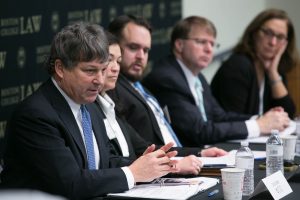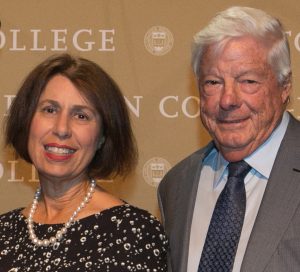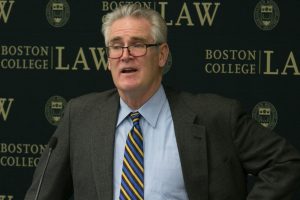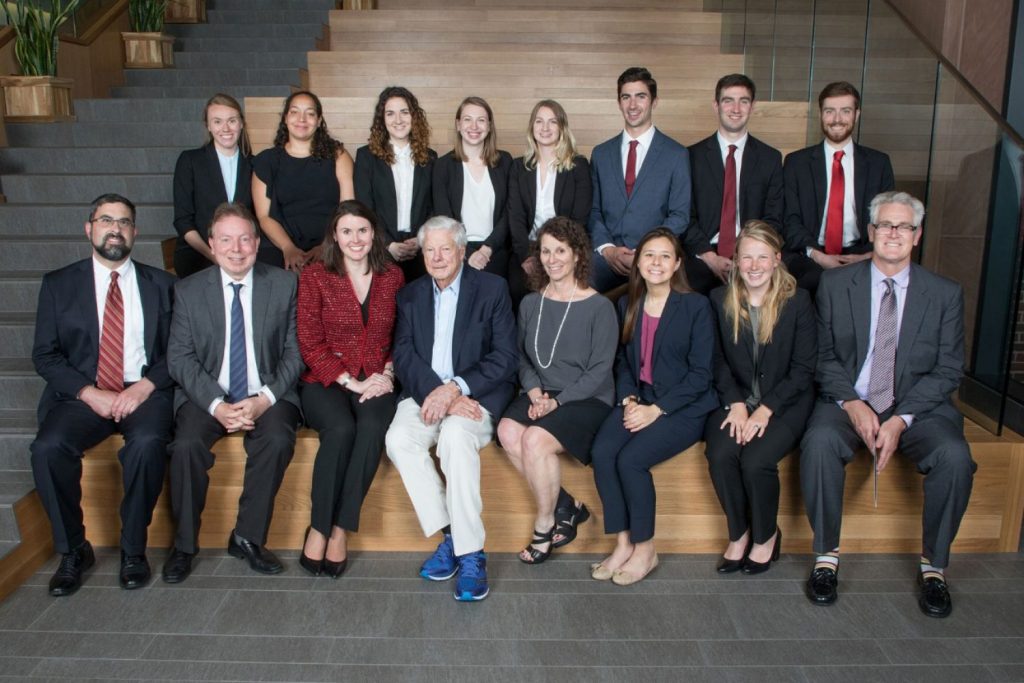The event was like so many BC Law’s Rappaport Center has presented, bristling with ideas and stimulating conversation. A forum of passionate, well-informed civic stakeholders had gathered, intent on making their community better—in this instance, by tickling out ways to reform criminal justice in Massachusetts.
It was February 21, 2017, and among those in the audience was attorney Richard Cole, chair of the Massachusetts Bar Association’s Civil Rights and Social Justice Section Council. For some time, Cole and other MBA colleagues like Kevin Curtin ’88 had been discussing criminal justice reform, and in October 2016 they formed the MBA’s Criminal Justice Reform Working Group to propose specific, concrete proposals to help address some of the key challenges in the criminal justice system, including conviction integrity.
Cole arrived at Boston College Law School that day eager to learn more about emerging criminal justice reform ideas. Of particular interest to him was the session on best practices to identify and rectify wrongful conviction and miscarriages of justice. Among the panelists was BC Law professor and director of the school’s Innocence Program, Sharon Beckman, an attorney from the Dallas District Attorney’s office, and a judge from the North Carolina Supreme Court, all of whom had experience with conviction integrity efforts that could possibly serve as models for Massachusetts. What a timely panel, Cole thought.
He had little idea at the time just where it might lead him.

As envisioned by Phyllis and Jerome Lyle Rappaport and supported by the foundation that bears their name, the Boston College Law School Rappaport Center for Law and Public Policy is a locus of public policy reflection and activity, hosting a distinguished public policy series of events, influential lecturers, and visiting professors, and supporting a fellowship program that mentors students in public policy and interns them to government agencies and civic entities.
“The energy generated by the Rappaport Center has been felt in every corner of the Law School, the University, and well beyond,” said Dean Vincent Rougeau. “The stakes for our democracy are high. The topics under discussion have been timely and provocative. And the debates have been powerful reminders of the importance of informed policy making. Our collaboration with the Rappaport Center has provided our students and the community as a whole with all that we hoped it would—and more.”
This past September, the center began its fourth year at BC Law by welcoming Professor Daniel Kanstroom as its new Faculty Director and retired Supreme Judicial Court Justice Robert Cordy and Connecticut Governor Dannel Malloy ’80 as the 2018-2019 academic year’s Distinguished Visiting Professors (fall and spring, respectively).
Under the leadership of inaugural Faculty Director R. Michael Cassidy and Executive Director Elisabeth J. Medvedow, the mandate of Phyllis and Jerome Rappaport to improve understanding of public policy issues has been animated by the challenging ideas, perspectives, and analyses brought to BC Law by the center’s leadership and participants.
The center’s ability to attract top policy influencers early in its years at the Law School is due to several key factors: the Rappaport name, Cassidy’s deep roots in the legal and public service community, and Medvedow’s capabilities as a well-connected and indefatigable networker and administrator. Together, they advanced a robust mix of scholarship, experiential learning, and community engagement.
According to Cassidy, the Rappaport Center has reenergized the Law School’s deep and longstanding commitment to preparing students for a lifetime of leadership in public service. “Our former dean, Robert Drinan, SJ, was fond of saying that ‘lawyers are the architects of a just society.’ The Rappaport Center allows us to expose our students daily to the pivotal role lawyers in all subject areas play in shaping public policy, both regionally and nationally,” Cassidy said.
“The Rappaport Center’s reputation enables us to secure panelists and speakers who are experts in their field, incredibly smart and articulate, and who present practical insights and approaches to solving complicated, and at times, intractable societal issues,” said Medvedow.

The numbers tell much of the story. In its first three years at BC Law, the Rappaport Center presented 50 lectures, symposia, and conferences and hosted 30 A-list speakers, among them 3 current or former governors, 2 former lieutenant governors, 3 US legislators, 3 attorneys general, 3 cabinet secretaries, 2 state supreme court justices, and 5 mayors. And that’s not counting the prominent academic, civic, business, and nonprofit leaders, and state and local officials who have given new meaning and urgency to the role of public policy in the life of the Commonwealth.
National and local voices heard in the past three years include those of former presidential candidate and Maryland governor Martin O’Malley, US Ambassador and Iran negotiator Wendy Sherman, former US Solicitor General Donald Verrilli Jr., US Attorney for Massachusetts Carmen Ortiz, Massachusetts Supreme Judicial Court Chief Justice Ralph Gants, Congresswoman Katherine Clark, Middlesex District Attorney Marian Ryan, Boston City Councilor Michelle Wu, Newton Mayor Setti Warren, AG Maura Healey—the list goes on.
Similarly, the parade of topics discussed has been wide ranging: student debt, women in politics, criminal justice reform, public health, constitutional democracy, immigration enforcement, gun control, wealth inequality, and free speech, to name a few.
One of the largest beneficiaries of this outpouring has been the student body. Attending events, interacting in classrooms with Rappaport’s professors and lecturers, and competing for the coveted summer Rappaport Fellowships, students have become attuned to public policy as a viable and rewarding legal career.
“There is only so much a law school casebook can teach you about innovation and problem-solving,” said James Bor-Zale ’17, a 2015 summer Rappaport fellow who began clerking at the Massachusetts Supreme Judicial Court after graduation. “That summer, I found out quickly that a law school fact pattern is no substitute for experiential learning. A meaningful moment was touring Codman Academy, a high school located within a community health center. It was eye-opening learning how school and community leaders were leveraging wellness and nutrition as a way to achieve student success,” Bor explained.
“A primary goal of the center is to demonstrate how important public policy is in terms of a law school education,” said Jerome Rappaport, founder and trustee of the Phyllis and Jerome Lyle Rappaport Foundation. “Two things students learn are that there are a lot of good people in government, and that it’s not impossible to change law and sometimes it’s very easy. To give people the sense that if it’s the right time and they’re in the right place, they can change things, is very empowering.”
“The law is stronger and more just when policy leads its creation.” —Rappaport Fellow Lauren Koster ’19
Each year the Rappaport Center at BC Law selects 12 Rappaport Fellows from Massachusetts’s eight law schools. A similar program, the Public Policy Summer Fellows for graduate students in other fields, is administered by the Rappaport Institute for Greater Boston at Harvard University. Between the two programs, and including the students who participated when Suffolk Law School housed the Rappaport Center, there are now some 400 alumni fellows. The fellowship program, said Medvedow, “is wildly successful.”
Add to them the mentors at state and local agencies where fellows are placed, the centers’ directors and advisors, and the Rappaport event participants, and it’s not hard to see why the program has reached a level of breadth and integration that pleases Jerome Rappaport. “The community reflects a unique network that demonstrates that the fellows program has impacted people, more frequently than not, to go into public service at the state and local level. I love to see this mature,” he said.
Indeed, one student called the Rappaport Fellowship the highlight of his law school education. Another, Lauren Koster ’19, who interned with the Office of the General Counsel for the Massachusetts Department of Elementary and Secondary Education, worked on finalizing drafts of new regulations.
A school teacher and education policy advocate before attending law school, she was still surprised by how law can be shaped by the input of not only lawyers but also a host of other stakeholders, including public commenters. Koster came to understand that law and policy can and should be one and the same. “The law is stronger and more just when policy leads its creation,” she said. After a clerkship upon graduation, she hopes to work in a legal aid organization or state agency on policy issues affecting the whole child through education, juvenile justice, and child welfare.

That is exactly what Professor Cassidy imagined when he was appointed to a three-year term as the center’s first faculty director after it moved to BC Law from Suffolk University at the beginning of the 2015-2016 academic year.
Cassidy wanted the Rappaport Fellowship to be an in-demand and respected brand supplying the policy internship-to-career pipeline. The Rappaport Center achieved that. He envisioned a distinguished lecture series on the theme of fighting for public interest and public policy. The center achieved that. And he wanted students to view legal education as opening an avenue to public policy work. “The fellows,” he said, “have done really interesting work that they maybe couldn’t have afforded to do or wouldn’t even have thought possible without the mentoring they received.”
From her vantage point as Chair of the Board of the Rappaport foundation, Phyllis Rappaport sees a widening circle of talent fanning out and populating local law firms and city government, legislative offices and the statehouse. “The mentors and supervisors of the fellows feel like they’re getting new energy by working with the students, and each year they raise their hands and want more students,” she said. “This injects a powerful, fresh view for both the people in the office and the people who are seeing for the first time how government works.”
Kanstroom, the new faculty director, believes that a factor in the Rappaport Center’s many successes is its alignment with Boston College’s commitments to good government, public service, human rights, and ethics along with the University’s appreciation for interdisciplinary study.
“Boston College has a long-standing, genuine, and deep commitment to rigorously ethical, academically sound, multi-disciplinary approaches to complex public policy questions,” he said. “This creates an excellent synergy with the Rappaport Center that opens many doors for exciting future programming and research initiatives.”
Faculty throughout the university—among them professors of social work, political science, and education—are excited by and participating in Rappaport programming. The doors are wide open to more collaborations.
Further, Kanstroom has recently announced that the center is expanding the research component of its fellowship program. Current and future fellows will undertake deep, impactful research on legal and policy issues. Published work may be disseminated as briefings or “white papers” by the Rappaport Center. In extraordinary cases, they may also be published in law reviews or other academic sites.
The Rappaports like what they are seeing as the center enters its fourth year on the cutting edge of public policy debate. “Promoting emerging leaders is our logo. We like the idea of talent energizing other talents,” said Phyllis Rappaport.
Clearly, Rappaport’s impact continues to grow. Remember Richard Cole from the Mass Bar Association, who participated in the Rappaport conference on criminal justice reform?
Eighteen months later, with the backing of the MBA’s House of Delegates, Cole facilitated the convening of a Conviction Integrity Working Group with Massachusetts Attorney General Maura Healey, Middlesex County District Attorney Marian Ryan ’79, and other key players, including experts like the aforementioned Professor Sharon Beckman, director of BC Law’s Innocence Program, which co-sponsored the 2017 event. The goal, according to the MBA’s eJournal: “To develop a series of model polices, suitable for all district attorney’s offices in the Commonwealth [and the Office of Attorney General], that will help prevent pre-trial instances of prosecutorial misconduct and remedy wrongful convictions.”
“The Rappaport program turned out to be very helpful,” Cole said. “It reinforced our need to research effective program models and identify pivotal stakeholders to enable us to achieve our goal.”
Photograph at top, front row, l-r: Dan Ordorica, Daniel Kanstroom, Laura Koster, Jerome Rappaport, Elisabeth Medvedow, Robyn Casper, Meg Ziegler, Michael Cassidy. Back row, l-r: Jennifer Peterson, Siri Nelson, Anna Madrishin, Cloe Pippin, Kayla Venckaukas, Michael Anderson, Garrett Casey, Sam Burgess.


